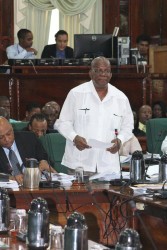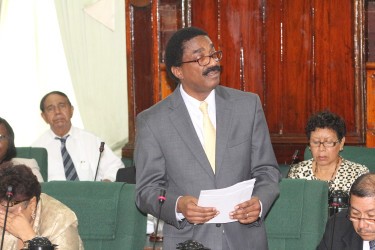The National Assembly yesterday passed a bill that seeks to provide financial autonomy to constitutional bodies, including the service commissions, the Ombudsman’s office and the elections commission.

Attorney-General Basil Williams said the Constitution (Amendment) Bill 2015 seeks to restore due constitutionality and the independence of certain constitutional agencies and bodies.
The Bill was previously passed by APNU and AFC while they were in opposition but they failed to persuade the Donald Ramotar administration to give assent to enact the legislation. Former Attorney General Anil Nandlall had previously advised against assent, saying there must be a two-thirds majority to amend the Constitution or there could be a constitutional crisis in the making.
In his presentation to the House, which saw another sitting without the parliamentary members of the PPP/C, Williams said the bill will enhance the functioning of the entities by guaranteeing and strengthening their administration and control of moneys allocated to them for carrying out their functions pursuant to the constitution.
The Bill seeks to amend the Third Schedule of Article 222 (A) of the Constitution to assure the independence of entities, including the Chambers of the Director of Public Prosecutions, the Judicial Service Commission, the Public Service Commission, the Police Service Commission, the Teaching Service Commission, the Public Service Appellate Tribunal, the Public Procurement Commission, Office of the Ombudsman and the Guyana Elections Commission.
According to Williams, the Bill states that the expenditure of each of the entities shall be financed as a direct charge on the Consolidated Fund, determined as a lump sum by way of an annual subvention approved by the National Assembly.

The Third Schedule currently only lists the Ethnic Relations Commission, the Human Rights Commission, the Women and Gender Equality Commission, the Indigenous Peoples’ Commission, the Rights of the Child Commission, the judiciary and the Office of the Auditor General.
Foreign Affairs Minister Carl Greenidge cautioned that the amendment would not give the entities the right to ask for whatever they want and to spend it how they want without the approval.
However, he said it would serve to curb the excesses that Guyanese have become fed-up with, including abuse of constitutional offices. He pointed out that because the agencies are autonomous, they are not to be treated as budgeted agencies, which would require them “to go through hoops that have to do with agencies that are, in effect, subservient.”
According to Greenidge, there is a provision in the Fiscal Management and Accountability Act that allows the financial secretary to interrogate the head of any budget agency. The bill, he said, seeks to remedy things and the government is determined that they should not be allowed to occur again and he urged his colleagues that the spirit behind the bill be remembered.
Minister of Social Protection Volda Lawrence said the amendment proposed in the bill seeks to ensure greater responsibilities for the management, functioning and control of the named institutions. It seeks to give the institutions the power of administering and controlling monies allocated to them for the execution of their duties, she added.
“This reduces the dependence on other institutions, such as the executive arm of the government, thereby lessening the rule, sir, for encroachment and interference,” Lawrence said, while adding that the efficiency of institutions is limited when they are forced to depend on the executive for funding, which she called inexcusable and a mockery of the independence that the constitution stipulates.
She noted the dire consequence for the institutions should the government refuse or delay much-needed funding or resources for their effective functioning.
“We have seen the countless hiccups and lack of transparency that have occurred in the past as a result of this…,” the minister said.
Lawrence stressed that it is the administration’s intention to ensure that all of the commissions are operational and they receive the resources for optimal operation, since fully operational independent institutions are critical for democracy because they serve to administer “checks and balances and keep governments accountable….” They also provide recourses for citizens and prevent illegalities or unconstitutional conduct.
In urging the passage of the bill, Lawrence said it would assure Guyana of the independence of commissions and offices and renew their faith in the government and the country to offer them social protection by ensuring that there is no political interference.





